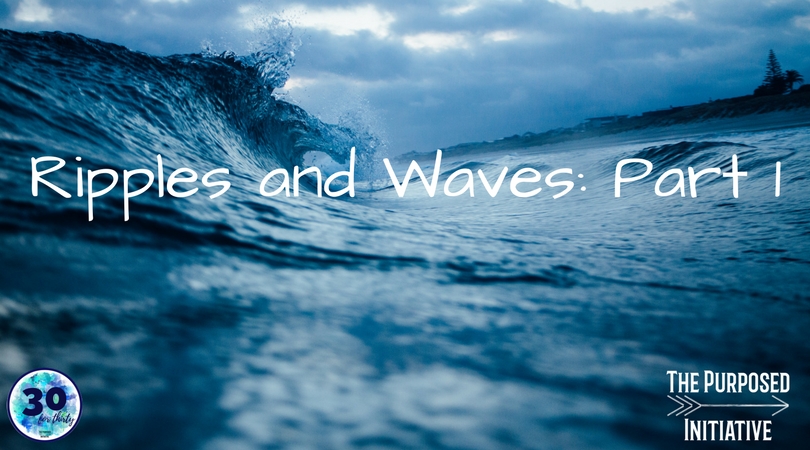 Our 6 year old loves playing in water, it’s always been one of his favourite things to do. He loves jumping in it, splashing in it, sticking his face under the water and just generally playing in it and with it as much as he can. Whenever we come across a body of water, whether it’s the beach, a river, a pond or a puddle, one of the things he loves most to do is throw rocks into the water to watch the splash. Emily and I have often spent time just standing or sitting next to the water while he runs back and forth collecting rocks to throw as high and far as he can and then waiting with excitement for the splash.
Our 6 year old loves playing in water, it’s always been one of his favourite things to do. He loves jumping in it, splashing in it, sticking his face under the water and just generally playing in it and with it as much as he can. Whenever we come across a body of water, whether it’s the beach, a river, a pond or a puddle, one of the things he loves most to do is throw rocks into the water to watch the splash. Emily and I have often spent time just standing or sitting next to the water while he runs back and forth collecting rocks to throw as high and far as he can and then waiting with excitement for the splash.
 One of the things I always notice when those rocks hit the water is that the splash isn’t the end. Following the splash there are ripples in the water which flow out from the point of impact across the water until they either dissipate or meet the shore. It’s never just the splash, there is always the flow on effect. A small rock may only cause a little splash and a few ripples which don’t travel far, a large rock is bound to cause a bigger splash and ripples which travel further and last longer. The events and situations that happen in our lives are often like these rocks and their impact on the water. So often we have something happen in our lives which causes a bit of a “splash”. The thing is, the situations don’t end with the splashes, and there are ongoing ripple effects which spread through our lives. Sometimes the splashes are small and the ripples short-lived, we recover quickly and can move on like nothing has happened. Other times the splashes are bigger and the ripples more ongoing, meaning it takes us longer to find our level again and move on.
One of the things I always notice when those rocks hit the water is that the splash isn’t the end. Following the splash there are ripples in the water which flow out from the point of impact across the water until they either dissipate or meet the shore. It’s never just the splash, there is always the flow on effect. A small rock may only cause a little splash and a few ripples which don’t travel far, a large rock is bound to cause a bigger splash and ripples which travel further and last longer. The events and situations that happen in our lives are often like these rocks and their impact on the water. So often we have something happen in our lives which causes a bit of a “splash”. The thing is, the situations don’t end with the splashes, and there are ongoing ripple effects which spread through our lives. Sometimes the splashes are small and the ripples short-lived, we recover quickly and can move on like nothing has happened. Other times the splashes are bigger and the ripples more ongoing, meaning it takes us longer to find our level again and move on.
 For example, think about what it’s like when you have a disrupted night’s sleep: you wake up tired, crabby, not thinking clearly and not reacting to things as well as you normally would. During the day you might make mistakes you wouldn’t normally make, you might drop and break your coffee cup when making your fourth cup for the day, and you might snap at someone who was trying to help because you’re just not in the mood. Some of these things can be simply fixed: you go to bed early the next night and catch up on your rest, and buy a new coffee cup on the way to work the next day, those are the ripples that fade quickly. But maybe the person you snapped at takes it to heart and it takes some work to rebuild the relationship, that is a ripple that last longer and takes more leveling out.
For example, think about what it’s like when you have a disrupted night’s sleep: you wake up tired, crabby, not thinking clearly and not reacting to things as well as you normally would. During the day you might make mistakes you wouldn’t normally make, you might drop and break your coffee cup when making your fourth cup for the day, and you might snap at someone who was trying to help because you’re just not in the mood. Some of these things can be simply fixed: you go to bed early the next night and catch up on your rest, and buy a new coffee cup on the way to work the next day, those are the ripples that fade quickly. But maybe the person you snapped at takes it to heart and it takes some work to rebuild the relationship, that is a ripple that last longer and takes more leveling out.
 Sometimes though, the things that happen in our lives are less like rocks splashing, and more like earthquakes shaking us. In these situations, for example the loss of a loved one, a serious illness, or a relationship breakdown, it is not just an external disruption, but the very foundations of our lives which feel shaken. Things shift and feel like they will never return to normal again. From these quakes can come tsunamis which change the landscape of how we view the world and can knock down the structures we have built to keep ourselves secure. The can level the mountains which we once held as the most important and raise up other things in their place. There are times during these cataclysms where we can doubt our ability to survive or press on, where everything can feel futile in the face of what is happening, but just like the ripples settle from the impact of the rock, so also eventually the tremors subside and the waves calm, leaving us to evaluate what is left and how to rebuild.
Sometimes though, the things that happen in our lives are less like rocks splashing, and more like earthquakes shaking us. In these situations, for example the loss of a loved one, a serious illness, or a relationship breakdown, it is not just an external disruption, but the very foundations of our lives which feel shaken. Things shift and feel like they will never return to normal again. From these quakes can come tsunamis which change the landscape of how we view the world and can knock down the structures we have built to keep ourselves secure. The can level the mountains which we once held as the most important and raise up other things in their place. There are times during these cataclysms where we can doubt our ability to survive or press on, where everything can feel futile in the face of what is happening, but just like the ripples settle from the impact of the rock, so also eventually the tremors subside and the waves calm, leaving us to evaluate what is left and how to rebuild.
 One of the inevitable things about life is that we are going to face challenges. Whether these challenges cause ripples, or whether they cause waves, it is up to us to decide how we respond and one of the biggest factors in determining how we respond is our anchor. Whatever it is that we put our hope in and hold onto when the storms come will be critical in determining how well we stand against them. Do we hold on to money, or possessions, or position? Or do we hold on to something more solid and substantial? In the Bible, the author of Hebrews talks about our hope in Christ being that anchor (Hebrews 6:19). Because we know that God has promised to make everything work together for our good (Romans 8:28) we can trust that even the hardest time will help us grow.
One of the inevitable things about life is that we are going to face challenges. Whether these challenges cause ripples, or whether they cause waves, it is up to us to decide how we respond and one of the biggest factors in determining how we respond is our anchor. Whatever it is that we put our hope in and hold onto when the storms come will be critical in determining how well we stand against them. Do we hold on to money, or possessions, or position? Or do we hold on to something more solid and substantial? In the Bible, the author of Hebrews talks about our hope in Christ being that anchor (Hebrews 6:19). Because we know that God has promised to make everything work together for our good (Romans 8:28) we can trust that even the hardest time will help us grow.
 Storms will come, there’s no avoiding them. In the midst of the crisis it may just be a matter of putting your head down and pushing on, one foot in front of the other. Sometimes we may just need to take a moment to catch our breath, hold on to our anchor, and allow the worst of it to wash over remembering that no matter the size or strength of the storm it will eventually pass. A firm anchor will enable us to hold our place through the storm, a weak one may see us tossed about by the waves. But once the storm has passed, once we have withstood the shaking and ridden the waves, that is where our growth and progress lies. Because what we so often see with these storms is their ability to show us the things that truly matter and help us to let go of things that don’t. In the calm after the storm is our chance to re-evaluate what is important, to refocus on where we want to be going and to rebuild our structures on a firmer foundation. In these moments our healing comes, not necessarily all at once, but just like the ripples slowly fade from the surface of the water, so to in time the pain and anxiety will subside and we will be whole again allowing us to move on and grow.
Storms will come, there’s no avoiding them. In the midst of the crisis it may just be a matter of putting your head down and pushing on, one foot in front of the other. Sometimes we may just need to take a moment to catch our breath, hold on to our anchor, and allow the worst of it to wash over remembering that no matter the size or strength of the storm it will eventually pass. A firm anchor will enable us to hold our place through the storm, a weak one may see us tossed about by the waves. But once the storm has passed, once we have withstood the shaking and ridden the waves, that is where our growth and progress lies. Because what we so often see with these storms is their ability to show us the things that truly matter and help us to let go of things that don’t. In the calm after the storm is our chance to re-evaluate what is important, to refocus on where we want to be going and to rebuild our structures on a firmer foundation. In these moments our healing comes, not necessarily all at once, but just like the ripples slowly fade from the surface of the water, so to in time the pain and anxiety will subside and we will be whole again allowing us to move on and grow.


Recent Comments